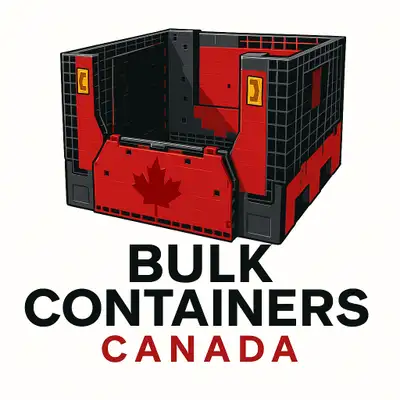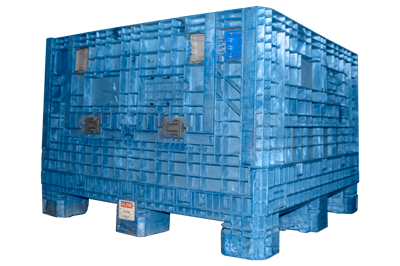The Ultimate Overview to Picking the Right Mass Containers for Your Organization Requirements
Picking the proper mass containers is important for any kind of service that relies upon efficient logistics. Numerous kinds of containers exist, each designed for details materials and applications. Elements such as dimension, material compatibility, and regulatory criteria play a significant role in this decision-making process. Comprehending these elements can bring about boosted operational effectiveness. However, many organizations neglect crucial aspects that might enhance their general effectiveness and sustainability. What are these factors to consider?
Understanding Various Kinds Of Mass Containers
Mass containers offer as vital devices for services looking for efficient storage space and transport options. These containers come in different types, each made to satisfy specific functional demands. One common kind is the intermediate bulk container (IBC), which is perfect for granulated and fluid products, offering an equilibrium of capacity and maneuverability. One more preferred option is the mass bag, or FIBC, suitable for dry, flowable items. These adaptable containers are light-weight and can be conveniently moved and kept. For larger products, inflexible bulk containers are usually employed, providing resilience and stability for risk-free handling. Additionally, there are specialized containers tailored for harmful materials, making sure conformity with safety and security regulations. Recognizing the distinct characteristics of these mass container types allows companies to make educated decisions that maximize logistics and minimize costs. By choosing the ideal container, business can boost their functional efficiency and enhance their supply chain procedures.
Secret Material Factors To Consider for Mass Containers
When selecting mass containers, it is necessary to contemplate the products utilized in their building. Variables such as chemical, toughness, and longevity compatibility play a critical function in guaranteeing the containers satisfy details functional requirements. Furthermore, weight and portability problems can impact both efficiency and transport logistics.
Product Toughness and Toughness
Longevity and strength are vital consider choosing products for bulk containers, as they straight influence the container's ability to withstand different ecological conditions and taking care of processes. Products such as high-density polyethylene (HDPE), polypropylene, and stainless steel are frequently favored for their robust residential or commercial properties, using resistance to temperature, effect, and abrasion fluctuations. The option of material likewise impacts the general life expectancy of the container; more powerful products normally result in less frequent replacements, resulting in set you back financial savings over time. Furthermore, the weight of the material can affect shipping costs and simplicity of handling. Companies must consider their particular functional settings and the possibility for wear and tear to guarantee peak longevity and strength in their mass container option.
Chemical Compatibility Aspects
Recognizing chemical compatibility is necessary for selecting bulk containers, as the products used must resist the details materials they will certainly hold. Different aspects influence compatibility, consisting of the chemical nature of the materials, temperature, and duration of storage space. For instance, corrosive chemicals may need containers made from stainless steel or specialized plastics that resist destruction. Furthermore, reactive substances can create warmth or gases, demanding aired vent or pressure-rated containers. The selection of container product, whether polyethylene, metal, or polycarbonate, should straighten with the chemical residential properties of the kept compounds to avoid leaks or violations. Eventually, a thorough examination of these compatibility elements assures secure handling and storage, safeguarding both personnel and the atmosphere while maintaining product stability.
Weight and Transportability Worries
Selecting mass containers involves not just evaluating chemical compatibility yet also taking into consideration weight and transportability. Services must evaluate the simplicity of handling and transport to enhance effectiveness. Light-weight products like high-density polyethylene (HDPE) or light weight aluminum can help with much easier motion and reduce shipping costs. Alternatively, much heavier containers may give enhanced resilience however can prevent mobility, specifically in atmospheres calling for frequent moving. Additionally, the design of the container should permit practical lifting and piling, ensuring ergonomic safety and security for workers. Companies must additionally think about the facilities readily available for transport; as an example, containers suitable with forklifts or pallet jacks can improve procedures. Inevitably, the right balance in between weight and portability directly affects operational efficiency and cost performance.
Sizing Your Bulk Containers for Ideal Effectiveness
When sizing mass containers, companies have to meticulously analyze the dimensions required to accommodate their particular products. Furthermore, weight capability is a crucial factor that affects efficiency and safety and security throughout transportation and storage space. Effective sizing not only makes the most of area yet likewise maximizes functional process.
Figuring Out Container Capacities
Picking the best measurements for mass containers is essential for making best use of performance in storage space and transport. Services need to analyze their specific needs, taking right into account aspects such as offered area, the nature of the products being saved, and the techniques of transport used. Exact measurements guarantee that containers fit preferably in storage facilities and cars, minimizing squandered space and lowering taking care of time. Standard sizes can use benefit, however customized dimensions could be required for one-of-a-kind needs or to accommodate certain products. Furthermore, it is essential to evaluate stacking capacities and accessibility, as these factors influence overall operational performance. Eventually, the right measurements result in boosted organization and structured logistics, profiting the total my company productivity of the company.
Weight Ability Considerations
Recognizing weight capacity is important for businesses aiming to maximize their bulk container efficiency. The weight capability of a container straight impacts storage space capacities, transport logistics, and overall functional costs. Choosing containers with the appropriate weight limitations ensures that organizations can safely keep and move their items without running the risk of damages or conformity issues. Straining containers can cause architectural failures, while underutilizing capability outcomes in lost sources. It is important for services to analyze their product weights and think about any regulative needs when picking containers. Additionally, elements such as the kind of material, planned usage, and ecological conditions must likewise influence weight ability choices. By reviewing these elements, businesses can improve effectiveness and ensure a structured supply chain.
Governing Compliance and Security Requirements

Governing conformity and safety standards play an essential role in the selection of bulk containers for services. Organizations has to ensure that their containers meet various policies set by neighborhood, national, and worldwide authorities. These requirements often relate to material security, architectural stability, and correct labeling, which assist protect against crashes and assure the safe transportation of goods.
Additionally, adherence to industry-specific standards, such as those from the Fda (FDA) or the Occupational Safety and Wellness Administration (OSHA), is important for firms dealing with harmful materials or food. Non-compliance can lead to penalties, lawful issues, or damage to a company's reputation.
Businesses need to likewise consider the container's compatibility with the materials being saved or transported to avoid contamination or chemical reactions (used plastic containers). To summarize, comprehending and carrying out regulatory conformity and safety and security standards is essential for the liable and reliable use mass containers
Sustainability Options for Eco-Friendly Bulk Containers

Business are likewise discovering choices made from recycled materials, which not only conserve resources however additionally sustain the recycling sector. Additionally, advancements in layout enable lighter containers that call for less energy to transport, further enhancing sustainability. By incorporating these environmentally friendly mass container choices, services can demonstrate their commitment to ecological stewardship while fulfilling customer need for sustainable methods. This shift not just helps the earth however can likewise improve brand name credibility and consumer commitment.
Cost-Effectiveness and Budgeting for Bulk Containers
While numerous services concentrate on sustainability, cost-effectiveness stays an important factor when choosing mass containers. Organizations should evaluate the first acquisition cost, as well as long-term functional costs, to assure financial stability. Variables such as longevity, upkeep, and reusability play a substantial duty in figuring out overall costs.
Purchasing top quality containers may generate higher in advance prices but can bring about financial savings via decreased substitute prices and reduced waste. Additionally, services should take into consideration transport expenses and storage space effectiveness, as these can affect the general spending plan.

Frequently Asked Concerns
Exactly how Do I Identify the Right Container for Hazardous Products?
To determine the best container for dangerous materials, one must examine compatibility with the material, think about the container's product, look for regulative conformity, and analyze ability and security functions to assure appropriate handling and storage.
Can Mass Containers Be Customized for Details Products?
Yes, bulk containers can be tailored for particular products. used collapsible containers. Numerous attributes, such as layout, dimension, and material, can be tailored to fulfill unique demands, guaranteeing suitable safety and security and efficiency for delivering and saving various items
What Is the Ordinary Life Expectancy of Different Mass Container Kind?
The typical lifespan of bulk container types differs; plastic containers last 5-10 years, metal containers 10-20 years, and wooden containers typically last 3-7 years, depending on usage, maintenance, and environmental problems.
How Should I Tidy and Maintain Bulk Containers?
To clean up and preserve bulk containers, one ought to routinely examine for damage, remove residue, wash with suitable detergents, wash extensively, and guarantee proper drying out prior to storage space. Complying with manufacturer standards boosts long life and security during use.
Exist Rental Choices for Mass Containers Available?
Yes, numerous firms provide rental options for bulk containers, supplying adaptability for organizations. These leasings can accommodate different demands, enabling business to take care of supply effectively without the commitment of acquiring containers outright.
Durability and toughness are vital aspects in selecting products for mass containers, as they straight affect the container's ability to endure various ecological problems and managing processes. Understanding chemical compatibility is essential for choosing mass containers, as the materials used must withstand the certain substances they will hold. Recognizing weight ability is vital for companies aiming to enhance their bulk container effectiveness. Regulatory conformity and safety and security criteria play an important duty in the option of mass containers for companies. While lots of businesses concentrate on sustainability, cost-effectiveness continues to be an read this important variable when picking mass containers.